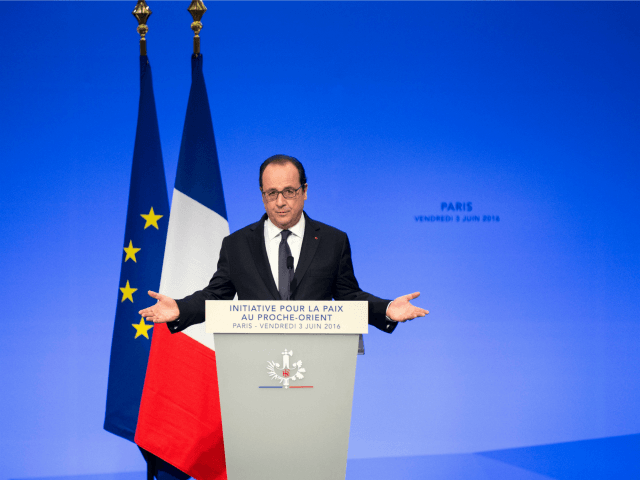TEL AVIV – Despite its own lingering problem of domestic Islamic extremism, France has turned its sights on attempting to solve the so-called Israeli-Palestinian conflict, holding a “peace” summit on Friday without the participation of either Israel or the Palestinian Authority.
French President Francois Hollande kicked off the conference by strongly implying that the failure to create a Palestinian state is at the heart of the problem throughout the Middle East.
“Violence is growing and hope is fading — that’s why we want to try and revive the peace process. We must work to realize that in the regional context and diplomatic vacuum will be filled by extremism and terror,” Hollande stated, according to Haaretz.
“Considerable progress has been made, but there is still no peace,” Hollande said. “France doesn’t seek anything for itself. Its sole purpose is to foster peace.”
Hollande seems to be glossing over sectarian violence in Egypt, Syria, Iraq, and beyond, conflicts that do not center around Israel or the Israeli-Palestinian issue.
Ignoring rampant Palestinian terrorism and official Palestinian Authority incitement to violence, the French Foreign Ministry explained one day before a summit on the proposal that Mideast peace is under threat, “particularly with regard to continued settlement activities.”
In other words, in the French view, Jewish construction is a main impediment to peace, and not the Palestinians’ support for terrorism or their decades-long refusal to reach a final-status deal despite Israeli willingness.
PA President Mahmoud Abbas has refused repeated Israeli offers to begin negotiations and he has not responded to Prime Minister Benjamin Netanyahu’s unprecedented gestures to jumpstart talks, including a temporary freeze on settlements – Jewish construction projects in eastern Jerusalem and the West Bank – and the release of Palestinian prisoners.
Abbas also walked away from the offer of a state from then-Prime Minister Ehud Olmert in 2007. And Yasser Arafat rejected U.S.-mediated talks at Camp David in 2000, instead returning to the West Bank to launch an intifada, or terror war, targeting Israelis. The Camp David talks offered Arafat a generous state in Gaza, the West Bank, and eastern Jerusalem, including authority over the Temple Mount, according to reports.
Meanwhile, present at the Paris peace summit were Secretary of State John Kerry, UN Secretary-General Ban Ki-moon, EU Foreign policy chief Federica Mogherini, and foreign ministers from the Arab League. Russia, Germany, Britain and Japan were also among the 26 nations represented at the conference, but those countries did not send high level delegations.
Notably absent were Israel and the PA.
The U.S. has said that Kerry attended to conference to listen to proposals but would bring bring any proposals to the table.
“We’re not bringing any specific proposals to this meeting tomorrow,” a senior State Department official was quoted as saying. “We haven’t made any decisions about what, if any, our role would be in that initiative going forward.”
Dore Gold, director-general of Israel’s Foreign Ministry, said the talks were doomed to fail and that they encouraged Palestinian extremism.
“This effort utterly failed then and will completely fail today,” Dore Gold stated, according to the Times of Israel. He was referring to a previous French attempt to draft the region’s borders.
“The only way to get a stable regional arrangement that will allow us to create real peace in the Middle East is if the parties of the region come to understandings between them,” Gold said.
“We believe the Arab states would give backing to direct negotiations between Israel and the Palestinians,” he added. “Therefore we prefer a Middle Eastern process and not a process that somebody is trying to create in Paris.”
The Jerusalem Post reported:
On Monday, Palestinian chief negotiator Saeb Erekat wrote in Le Monde that the old method of bilateral talks had failed and that the Palestinians were left no choice but to move to a “multilateral framework” that would allow the international community to impose international law in the region.
Gold said that these words indicate that the Paris conference has already “made the Palestinian positions more extreme, and made it more difficult to resume direct talks.”
Aaron Klein is Breitbart’s Jerusalem bureau chief and senior investigative reporter. He is a New York Times bestselling author and hosts the popular weekend talk radio program, “Aaron Klein Investigative Radio.” Follow him on Twitter @AaronKleinShow. Follow him on Facebook.

COMMENTS
Please let us know if you're having issues with commenting.